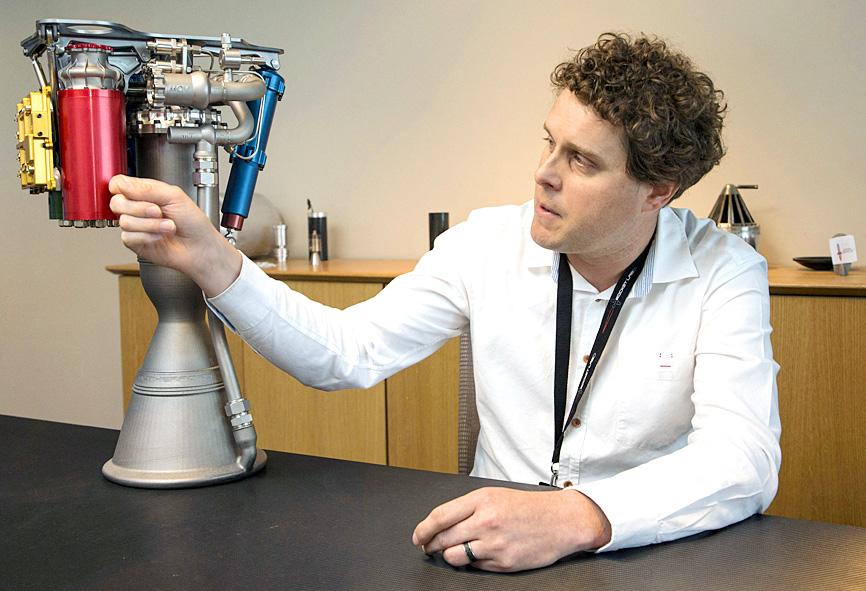Small rocket builder Rocket Lab USA is gearing up for a mission that seems more appropriate for a big-budget action movie: catching a falling four-story-tall rocket booster with a helicopter.
The Long Beach, California-based company is trying to slash the cost of spaceflight by reusing its rockets, a trend pioneered by billionaire tech entrepreneur Elon Musk’s SpaceX.
Unlike SpaceX’s reusable, two-stage rocket Falcon 9, which reignites its engines to return to Earth, Rocket Lab aims for a helicopter with two pilots to pluck an 11.9m booster stage from mid-air using a combination of ropes, parachutes and a heatshield.

Photo: Reuters
“I’m pretty confident that if the helicopter pilots can see it, they’ll catch it,” Rocket Lab CEO Peter Beck said. “If we don’t get it this time, we’ll learn a bunch and we’ll get it the next time, so I’m not super worried.”
Hinging on good weather, the capture test is due to take place this morning off the coast of Mahia, New Zealand, the location of Rocket Lab’s primary launch site.
Rocket Lab, which went public last year through a blank-check merger led by Vector Capital that valued it at US$4.1 billion, has launched about two dozen missions to orbit for a mix of government and commercial customers, three of which ended in mission failures.
The growing field of small rocket companies also includes Astra Space and Richard Branson’s Virgin Orbit.
Recovering rocket boosters with parachutes and helicopters instead of using its engines to land vertically means the rocket does not need to save extra — and heavy — fuel for a “propulsive” landing like SpaceX’s Falcon 9, Beck said.
Landing rockets vertically is also trickier for smaller, lighter rockets, engineers say.
Rocket Lab’s helicopter capture test is set to take place after the company’s Electron rocket launches 34 small satellites in a mission that Rocket Lab named “There and Back Again.”
After the first stage booster launches to space and releases its satellite-topped second stage toward orbit, it is designed to fall back to Earth at eight times the speed of sound, re-entering the atmosphere along a narrow path to rendezvous with the helicopter, which is equipped with tracking computers.
The booster stage is designed to deploy a series of parachutes to brake its speed. If all goes well, pilots would steer the helicopter, dangling a long cable underneath, toward the parachuting booster, hook onto it and carry it back to land.
A video of a previous test showed a dummy rocket stage drifting down beneath a parachute, with a smaller, secondary chute stretching the capture line to the side of the rocket, making it easier for the helicopter’s vertically hanging hook line to catch on. The helicopter remains well above the rocket.
“Every piece we’ve successfully tested individually, now it’s just an orchestra to conduct,” Beck said. “If we can use a rocket twice, then we’ve just doubled our production.”

A beauty queen who pulled out of the Miss South Africa competition when her nationality was questioned has said she wants to relocate to Nigeria, after coming second in the Miss Universe pageant while representing the West African country. Chidimma Adetshina, whose father is Nigerian, was crowned Miss Universe Africa and Oceania and was runner-up to Denmark’s Victoria Kjar Theilvig in Mexico on Saturday night. The 23-year-old law student withdrew from the Miss South Africa competition in August, saying that she needed to protect herself and her family after the government alleged that her mother had stolen the identity of a South

BELT-TIGHTENING: Chinese investments in Cambodia are projected to drop to US$35 million in 2026 from more than US$420 million in 2021 At a ceremony in August, Cambodian Prime Minister Hun Manet knelt to receive blessings from saffron-robed monks as fireworks and balloons heralded the breaking of ground for a canal he hoped would transform his country’s economic fortunes. Addressing hundreds of people waving the Cambodian flag, Hun Manet said China would contribute 49 percent to the funding of the Funan Techo Canal that would link the Mekong River to the Gulf of Thailand and reduce Cambodia’s shipping reliance on Vietnam. Cambodia’s government estimates the strategic, if contentious, infrastructure project would cost US$1.7 billion, nearly 4 percent of the nation’s annual GDP. However, months later,

The Philippine Department of Justice yesterday labeled Vice President Sara Duterte the “mastermind” of a plot to assassinate the nation’s president, giving her five days to respond to a subpoena. Duterte is being asked to explain herself in the wake of a blistering weekend press conference where she said she had instructed that Philippine President Ferdinand Marcos Jr be killed should an alleged plot to kill her succeed. “The government is taking action to protect our duly elected president,” Philippine Undersecretary of Justice Jesse Andres said at yesterday’s press briefing. “The premeditated plot to assassinate the president as declared by the self-confessed mastermind

Texas’ education board on Friday voted to allow Bible-infused teachings in elementary schools, joining other Republican-led US states that pushed this year to give religion a larger presence in public classrooms. The curriculum adopted by the Texas State Board of Education, which is controlled by elected Republicans, is optional for schools to adopt, but they would receive additional funding if they do so. The materials could appear in classrooms as early as next school year. Republican Texas Governor Greg Abbott has voiced support for the lesson plans, which were provided by the state’s education agency that oversees the more than